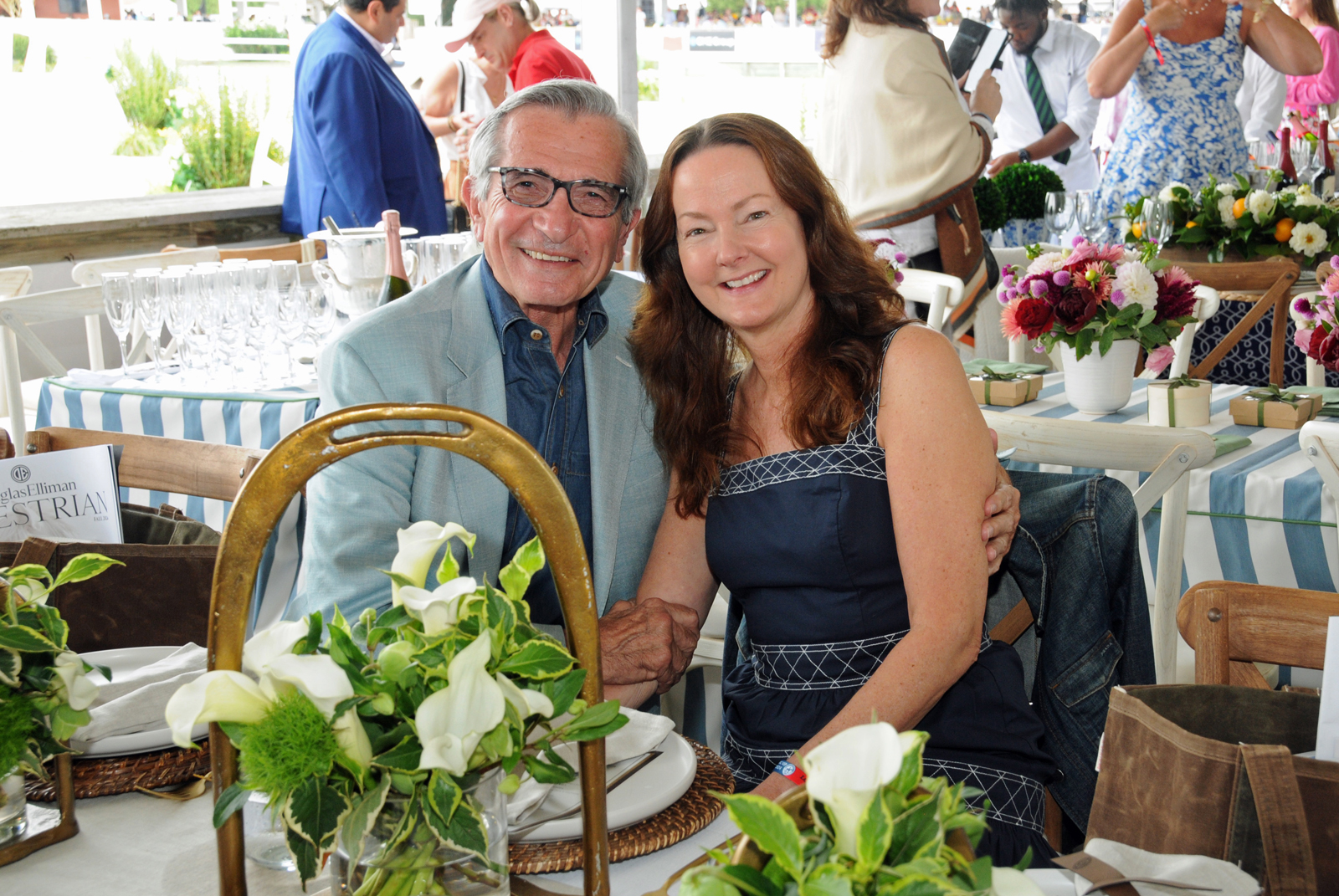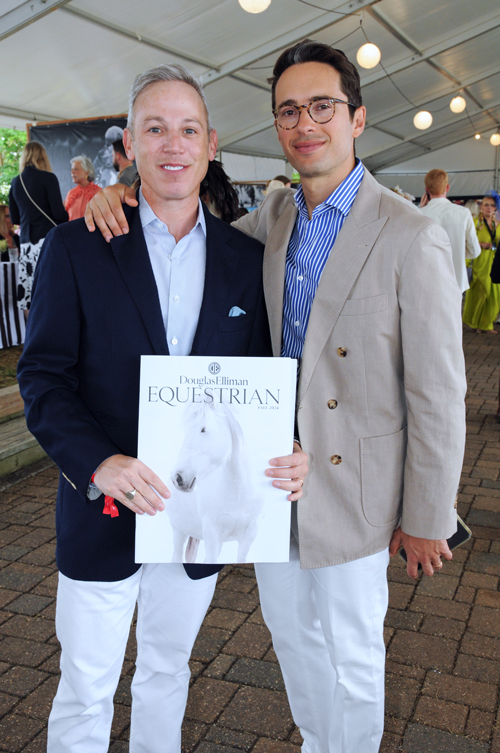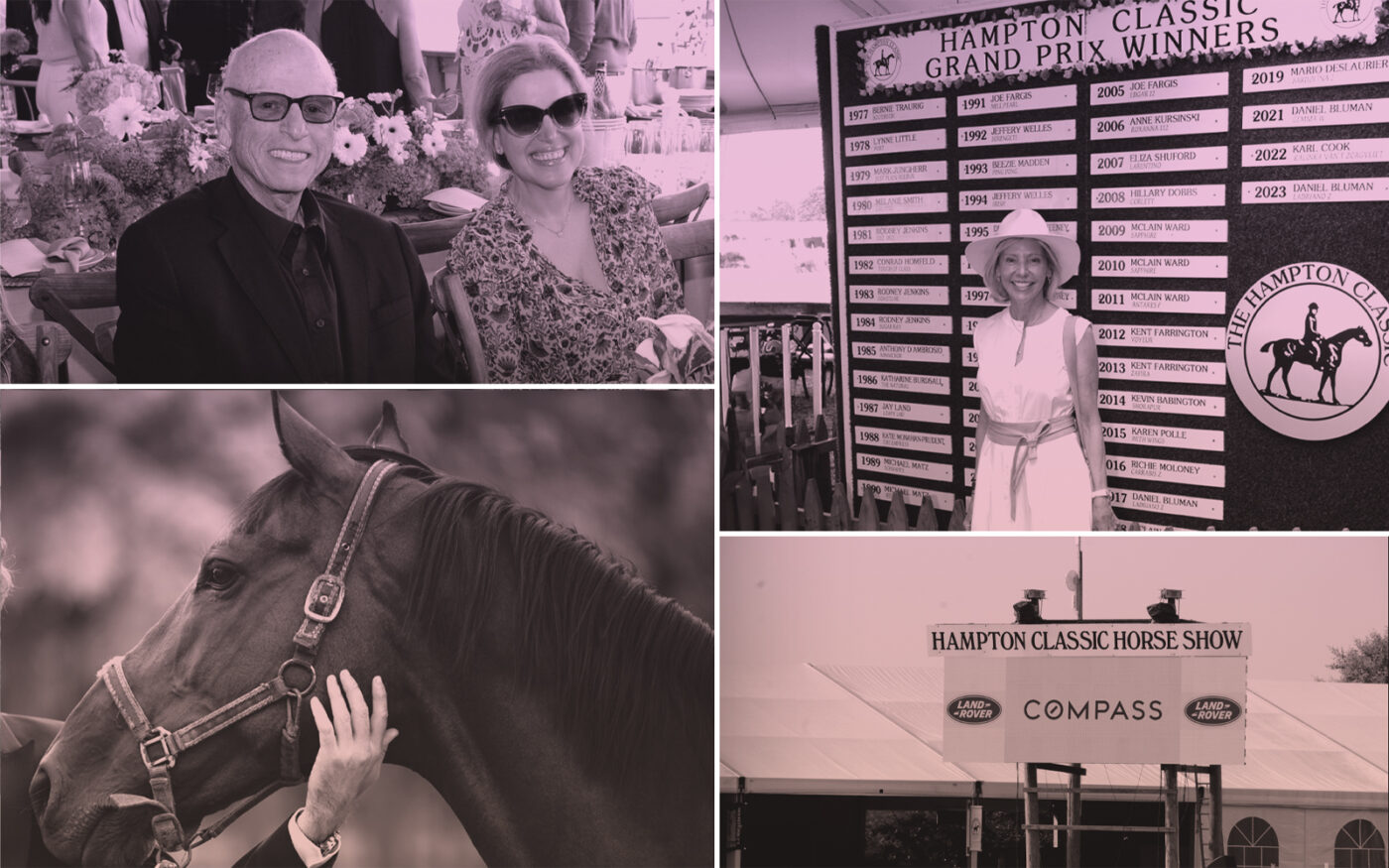On the Sunday before Labor Day, the last day of summer by certain old-school social calendars, the monied set descended upon the grassy grounds of the Hampton Classic in a final act of warm weather revelry.
Billionaire heiresses Georgina Bloomberg and Adrienne Sternlicht were among the riders who jumped their horses in the Grand Prix ring at the equestrian show. Fellow socialite and billionaire daughter Jennifer Gates, normally a competitor as well, sat at her VIP table sporting a baby bump while she watched her husband, Nayel Nassar, make his way through the course.
The spectators, bedecked in designer dresses, linen blazers and towering fascinators rivaling those donned by royal wedding goers and enveloped in a cloud of expensive perfumes, sipped Wölffer Estate rosé. One woman had a cascade of turquoise feathers woven into her hair. Riders leapt over a jump fashioned after the orange Hermès H, past Longines clocks and over a crisply painted white vertical bearing Douglas Elliman’s signature blue DE emblem on both sides.
It was a vivid slice of uppercrust life. And the place was crawling with real estate agents.
The Classic, once a small-time equestrian charity event, is now one of the foremost competitions on the American circuit and a major draw for luxury sector advertisers, including real estate brokerages. Douglas Elliman, Compass, Sotheby’s International Realty and Corcoran dropped thousands of dollars on sponsorships this year and fêted droves of agents and executives, all while jockeying for access to the horse world’s wealthy flock.
Both the backstory and current state of affairs at the Classic reveal an evolving and decades-long entanglement between real estate and the equestrian world, and brokerages who back the show assert it’s a lucrative arrangement, even at a moment of belt-tightening in the industry. But as the traditional summer season is losing some of its stature Out East and more agents are vying for the same limited slice of business, some brokerages have opted out of the pomp and expense of the Classic.
“That was the most fun I’ve had in a long time. Maybe I should buy a house in the Hamptons.”
Although participation is spendy, with ringside tables running $35,000 a pop, it’s a cost some brokerages are willing to pay, even now, when the slower residential markets are hurting their coffers. Austerity measures be damned; this is the Hampton Classic.
“I can’t even think that,” said Douglas Elliman CEO Scott Durkin, shuddering at the thought of his brokerage missing the horse show. “It’s super important.”
“They would have to cancel the Classic,” quipped Stephen Larkin, Elliman’s executive vice president and chief communications officer.
The money brokerages spend is crucial to the horse show. The Classic’s executive director, Shanette Barth Cohen, said that real estate makes up between 10 and 15 percent of sponsorship revenue in a given year. It’s not money down the drain, she said.
“Obviously, they’re seeing a return on their investment,” Barth Cohen said. “They’re seeing the value or they wouldn’t keep coming back.”
But as the investment has gotten steeper, is there still a payoff for brokerages?
A Classic tale
The Classic as it’s known today took shape in the 1970s. It runs for a week every year, ending on the Sunday before Labor Day with a final jumping competition for a $400,000 cash prize. VIPs drop thousands of dollars to cater and decorate their tables and compete among themselves for ribbons in the “Best Floral Design” category.
It wasn’t always such an affair, veteran attendees say.
“When we first started, [our] manager was bringing in fried chicken and sodas and champagne,” said Pam Liebman, the CEO of Corcoran, which has maintained a table at the Classic for roughly 20 years. “Now it’s quite elaborate.”
Paul Brennan, an Elliman agent who ran a small local brokerage in the 1990s, sponsored the show back in the day. He recalls VIP tables costing just $5,000 and having to prod people into attending.
“Back then, it was a lot of fun,” he said. “It’s sort of crazy now.”
Michael Braverman, who co-owned the brokerage with Brennan and served on the Classic’s board of directors for 30 years, said the competition was a regional show at the outset, but it’s since acquired accreditations that elevated it to one of the premier equestrian events of the year.

In the years of casual dining and a limited crowd, Braverman got the kind of business from the Classic that agents today would drool over. It’s harder to come by with more and more agents from big box firms flooding the scene and competing to connect with the same pool of clients.
“A mutual friend brought Martha Stewart to my table for the Grand Prix,” he said, remembering meeting one of America’s most famous hostesses.
A few days later, he got a call from Stewart.
“That was the most fun I’ve had in a long time,” Braverman recalls her telling him on the phone. “Maybe I should buy a house in the Hamptons.”
He sold Stewart more than a few homes in the years that followed.
The Elliman effect
Over the years, the Classic’s VIP tent has been a marker of the changing brokerage landscape in the Hamptons. Local shops have largely disappeared from under its shade, replaced by Manhattan firms with deeper pockets as consolidation has swept Long Island’s East End.
As bigger brokerages moved into the Hamptons, more money landed on the Hamptons social circuit, and it flowed to such events as the Classic.
Of the big brokerages, Elliman has made perhaps the largest financial commitment to the horse show. The firm started sponsoring the Classic 28 years ago. This year, it backed a $70,000 Grand Prix qualifier and four VIP tables, with decor, catering and gift bags to boot.
The Classic isn’t the only equestrian event Elliman sponsors; the brokerage also sponsors the Winter Equestrian Festival in Wellington, Florida, the Upperville Colt & Horse Show in Upperville, Virginia, and the Old Salem Farm Horse Show in North Salem, New York.
Durkin says that ingraining themselves in the equestrian community is a crucial element of their sales strategy, although Elliman isn’t the only firm with a division dedicated to the horse world. Equestrian estates are large and expensive, and the people who own them often buy and sell other properties too.
“A horse farm is not something you can sell if you’ve never been on a horse,” Durkin said. “Sponsoring these events allows our sellers and our clients to believe in what we say about having the best there is out there in terms of having the best agents and properties for the equestrian lifestyle.”

The growth of the brokerage presence at the Classic has also bolstered the atmosphere at the horse show. Barth Cohen said the Classic doesn’t offer exclusive sponsorship rights to any brokerages because the real estate crowd fuels the liveliness in the VIP tents.
“Most of the real estate partners entertain every day,” she said. “They help keep that exciting atmosphere on the weekend throughout the week.”
When Tyler Whitman and Dana Trotter wanted to open a franchise for The Agency in Bridgehampton, the two tapped the Classic as the backdrop of their arrival, rolling out the brand with a six-figure sum spent on a title sponsorship, VIP table and private ringside chalet.
Changing seasons
The show has long been considered the cap-off event of the summer season during the Hamptons’ busiest weekend, marking the transition from days of traffic-filled main roads, pricey beach access and crowded restaurants to what locals have dubbed “Tumbleweed Tuesday,” a holiday in its own right for Hamptonites who can finally reclaim their towns.
The Hamptons once operated on a tight schedule, with Memorial Day Weekend and Labor Day Weekend bookending its busy season, but the strict parameters of the calendar are fading. The pandemic-powered phenomenon of remote work has lent new flexibility to the well-heeled, allowing part-time Hamptons residents to come and go more frequently throughout the year. Some say this more fluid calendar has caused tentpole events such as the Classic to lose some of their luster.
And some brokerages say their money is better spent elsewhere. Notably absent from the scene were such boutique shops as Bespoke and Hedgerow Exclusive Properties, which have grown into top East End brokerages. Even The Agency, which dropped big bucks on the show last year, opted not to participate this year.
“Last year, the strategy was brand awareness within the real estate community,” Whitman said. “This year, we focused our marketing dollars on reaching the broader community” with advertising displayed on the Hampton Jitney and sponsorship with smaller, hyperlocal events.
The Classic’s detractors point to a heavy attendance by agents, saying that the week is more of an opportunity to reward top producers and less of a launch pad for dealmaking. And the expense isn’t something to blink at, they say.
The Fed just gifted real estate a half point rate cut, but two years of high interest rates have put a hot real estate market on ice. Less money through the door meant economizing for brokerages, but that hasn’t been the only trouble plaguing firms. National Association of Realtors lawsuits cost brokerages millions in settlements. Elliman saw its stock drop to $1, putting it at risk of delisting from the New York Stock Exchange. Anywhere, the parent company of Corcoran and Sotheby’s, ended 2023 with a $107 million loss.
But in the challenging housing market, it’s the luxury sector showing the most resiliency. In the first half of the year, 130 homes sold for $10 million or more in New York City, where most Classic attendees are based. Brokerages aren’t looking to pull back on marketing to luxury clients who are generating activity.
Besides, as Barth Cohen points out, it’s tradition: “They have to come back because they have a lot of people who are sort of expecting them to invite them to attend the show.”
